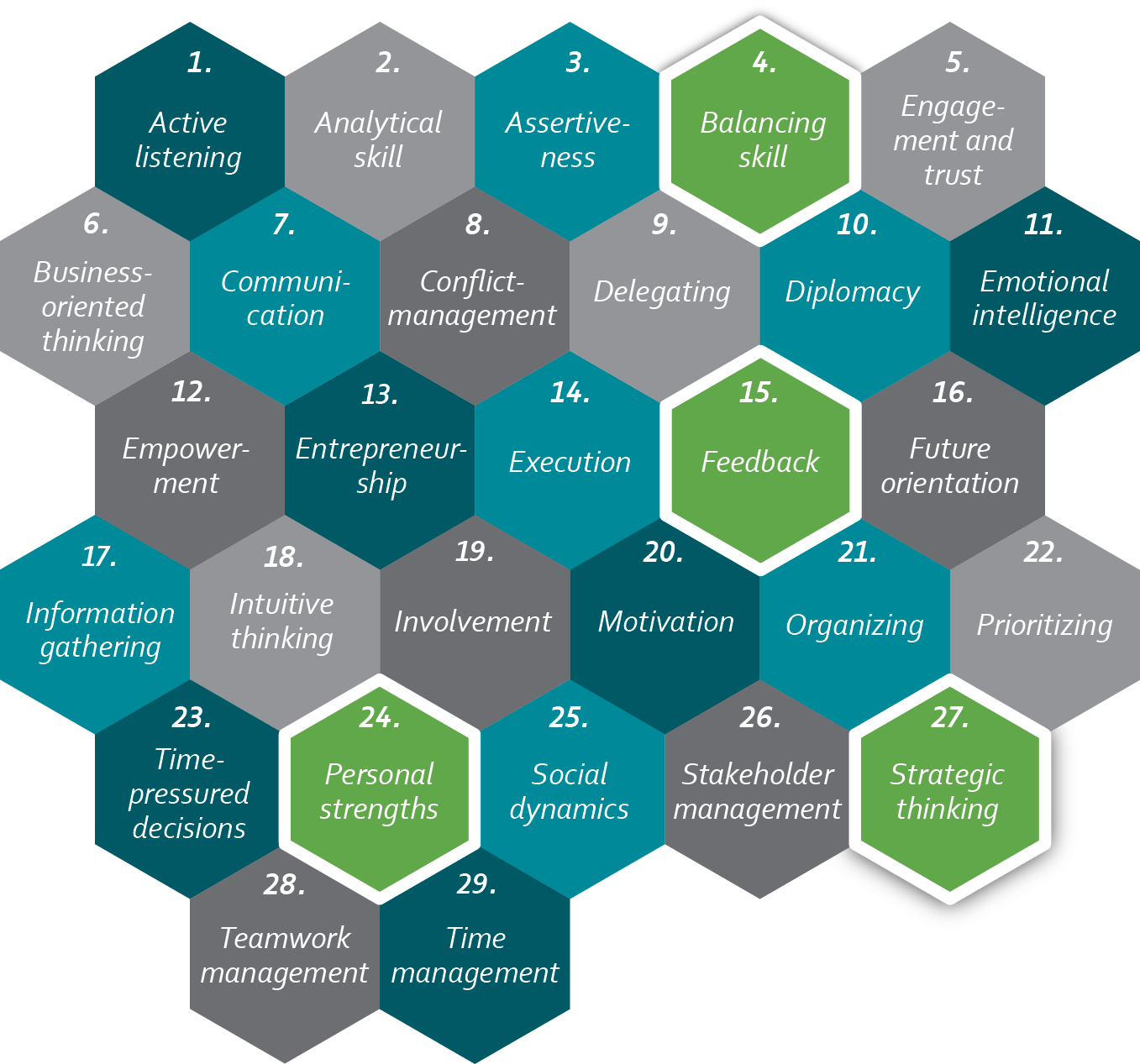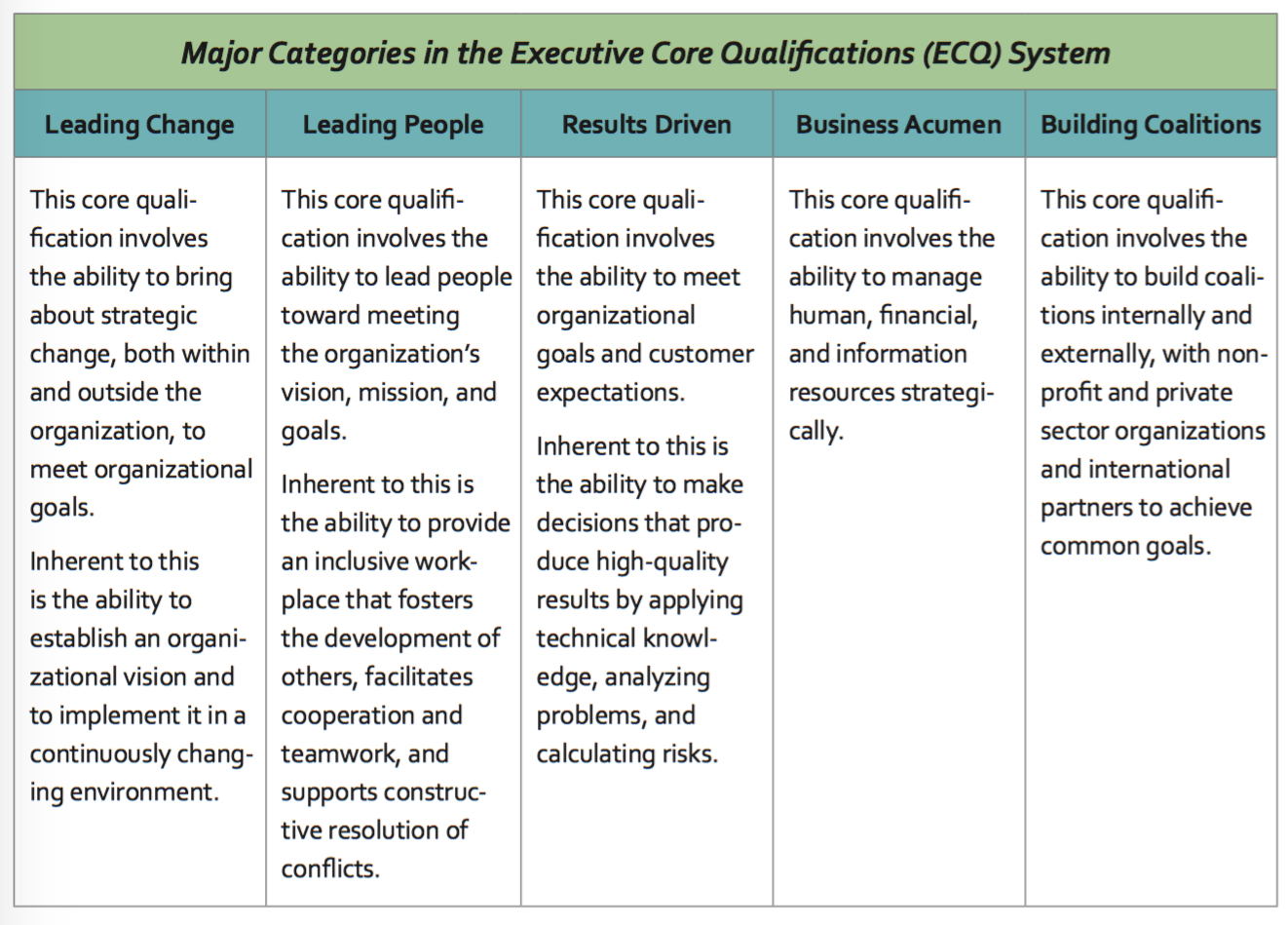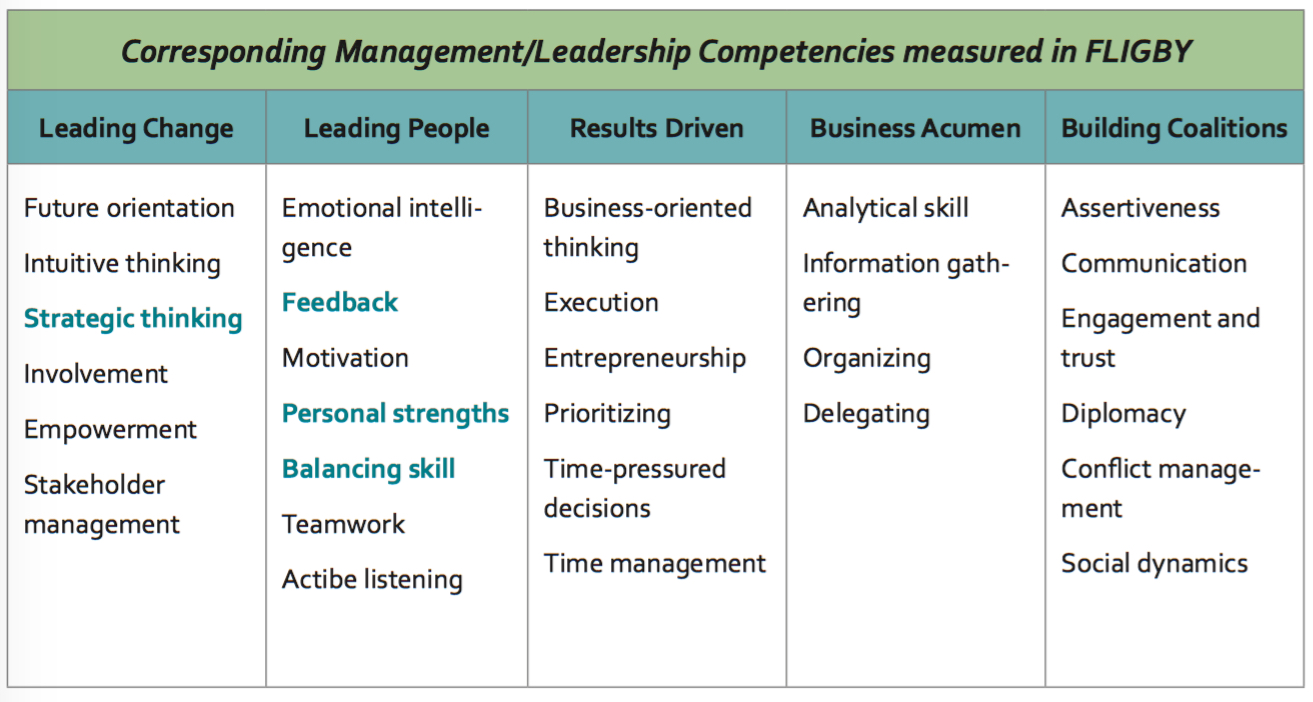FLIGBY Leadership Skills
Developing leadership competencies through serious games
The serious game FLIGBY aims to identify, measure, and help develop leadership skills that, if applied, would help create a Flow-promoting work environment. At the Game’s end, FLIGBY provides an individual report to each player on their skill set, with a range of benchmarking options available.
FLIGBY develops 29 management/leadership skills identified by Prof. Csikszentmihalyi and the architects of FLIGBY to measure leadership and management capabilities and potential.
A critical conceptual contribution of FLIGBY’s design to the academic and applied work on leadership is identifying those leadership skills that are particularly important for helping generate and maintain Flow at the workplace. While there is a substantial overlap between what might be called the mainstream sets of leadership skills and FLIGBY’s “Flow-supporting” leadership skills, FLIGBY contributes by introducing or emphasizing certain types of leadership skills. An example is “feedback,” a leadership skill more comprehensively defined in FLIGBY (in terms of specifying what content and delivery will make it effective), where feedback (or its absence) is given greater weight in the FLIGBY skillset than is usually found elsewhere:

The mission of the serious game FLIGBY is to identify, measure, and help develop leadership skills by using sophisticated game-based profiling. At the Game’s end, FLIGBY provides an individual report to each player on their skill set, with a range of benchmarking options available.
FLIGBY Leadership Skills in detail
- Active listening – Active listening is a way of responding to another person that improves mutual understanding. This method of listening involves understanding the content of a message, the sender’s intent, and the circumstances under which the message is given. Active listening is a structured form of listening and responding that focuses the attention on the speaker. The listener does not have to agree with the speaker – they must state what they think the speaker said.
- Analytical skill – Analytical skill is the readiness to visualize, articulate, and solve complex problems and concepts and make sensible decisions based on available information. Such skills include demonstrating the ability to apply logical thinking to gathering and analyzing data, designing and testing solutions to problems, and formulating plans.
- Assertiveness – Assertiveness is the readiness to express your emotions and needs without violating the rights of others and without being aggressive. Assertiveness is the behavior that enables you to act in your own best interests, to stand up for yourself without undue anxiety, to express your honest feelings comfortably, or to exercise your rights without denying the rights of others.
- Balancing Skill – Balancing skill is the readiness to maintain the same importance between things, considering them similarly. Effective leadership is about balance. A balance between challenges and skills is necessary for Flow. It is easier to become wholly involved in a task if we believe it is doable. If it appears beyond our capacity, we tend to respond by feeling anxious; if the task is too easy, we get bored. In either case, attention shifts from what needs to be accomplished—the anxious person is distracted by worries about the outcome, while the bored one starts searching for other things to do. The simple formula can express the ideal condition: Flow occurs when challenges and skills are high and equal.
- Building engagement – Building engagement is the readiness to create trust and a positive, fulfilling, work-related state of mind characterized by dedication. Dedication refers to being intensely involved in one’s work and experiencing a sense of significance, enthusiasm, and challenge. Building someone’s (the colleagues, the community) confidence in or reliance on some quality or attribute of a person or a thing, or the truth in a statement.
- Business-oriented thinking – Business-oriented thinking is the readiness to manage situations and solve problems to create added value for the company and, ultimately, value for the shareholders/stakeholders. To be successful in business development, you need to manage the opportunities and threats of the corporate environment and recognize organizational weaknesses to avoid and strengths to build upon.
- Communication – Communication skills are the set of skills that enable a person to convey information so that it is received and understood. Communication skills refer to the repertoire of interpersonal behavior.
- Conflict-management – Conflict-management is identifying and handling conflicts in a sensible, fair, and efficient manner. Conflict management is the principle that all disputes cannot necessarily be resolved, but learning how to manage conflicts can decrease the odds of nonproductive escalation.
- Delegation – Delegation is the readiness to confer functions or powers on another person so they can act on behalf of the manager. Delegation empowers a subordinate to make decisions, i.e., it is a shift of decision-making authority from one organizational level to a lower one.
- Diplomacy – Diplomacy is the readiness to consider the varying interests and values of the other parties involved in the negotiation, treating those differences with respect, and dealing with people tactfully.
- Emotional intelligence – Emotional intelligence is the capacity and readiness to understand, express and regulate emotions in oneself and others.
- Empowerment – Empowerment is the skill of sharing information, rewards, and power with employees so that they can take the initiative and make decisions to solve problems and improve service and performance.
- Entrepreneurship (Risk-taking) – Entrepreneurship is a capacity and willingness to conceive, organize, and manage a productive venture with all attendant risks while seeking profit as a reward. The entrepreneurial spirit is characterized by innovation and risk-taking and is essential to succeed in an ever-changing and more competitive global marketplace.
- Execution – Execution is performing and completing managerial tasks (execution of a plan, a task, etc.) and the readiness to do something successfully. We are managing the business aligned with the shared values. Executing strategic goals is by far the most significant challenge in the industry today.
- Feedback – Feedback to employees is information regarding their performance that they can also act on. Feedback must be shared in a manner that is understandable and perceived by them as being provided in a highly respectful manner. As an organization seeks to improve its performance, feedback helps it to make the required adjustments. Feedback is immediate. It is difficult for people to stay absorbed in any activity unless they get timely, “online” information about how well they are doing. The sense of total involvement in the flow experience largely derives from knowing that what one does matters and has consequences. Feedback may come from colleagues or supervisors who comment on performance, but preferably, the activity will provide this information.
- Future orientation – Future orientation is the readiness to think in the long term. This is the skill of being “forward-looking.”
- Information gathering – Information gathering is the readiness to collect adequate information to perform the next step based on this information. Managers must know what information to gather, where to find it, how to manage it, and ultimately how to process the collected data.
- Intuitive thinking – Intuitive thinking is a way of thinking that does not use rational processes such as facts and data. It is unfocused, nonlinear, sees many things simultaneously, views the big picture, and contains perspective. Good intuition comes from years of knowledge and experience that allow you to understand how people and the world works. Its strength is that it can produce a rapid result. It is acting on feelings or hunches. Emotions can also guide it.
- Involvement – Involvement is the readiness to participate in the activities of formal or informal teams/groups in the execution process.
- Motivation – Motivational skills enable a person to become motivated and work toward achieving goals. This is the readiness to understand what causes a person to become motivated and stay that way. It helps ensure people are the most productive they can be.
- Organizing – Organizing is the readiness to initiate, arrange and manage several elements into a purposeful structure. This is the ability to create a network of people throughout the organization who can help solve implementation problems as they occur. Good implementers customize this network to include individuals who can handle the particular types of problems anticipated in implementing a specific strategy.
- Personal strengths – Recognizing and applying personal strengths is the readiness to discover and put to good use the individual strengths of others that are not immediately obvious. It is the realization that those strengths can potentially induce flow states in that other person and thus benefit the organization.
- Prioritizing – Prioritization is the readiness to evaluate a group of items and rank them in order of importance or urgency.
- Social dynamics – An awareness of the complexity of many situations and the social dynamics that govern them. This skill can advance one’s interest – for the good or otherwise – and that of the organization.
- Stakeholder management – Stakeholder management is the ability to manage the business process, often involving a trade-off, to positively impact the organizations’ stakeholders, including that of society at large.
- Strategic thinking – Strategic thinking helps managers set goals, determine priorities, review policy issues, and perform long-term planning. Clear goals are necessary to reach the flow state. For a person to become deeply involved in any activity, they must know precisely what tasks they must accomplish moment by moment. Of course, the ultimate goals of the movement are also essential, but actual enjoyment comes from the steps one takes toward attaining a goal, not from actually reaching it.
- Teamwork management – Teamwork management is the readiness to form, facilitate and monitor teamwork and teams.
- Time management – Time management is a readiness of systematic, priority-based structuring of time allocation and distribution among competing demands.
- Time-pressured decision-making – Decision-making under time pressure is a readiness that enables effective decision-making when limited time and inadequate information are available. This is the skill to decide authoritatively and to be consistent with one’s decisions.
Skill combinations – Executive Core Qualifications
To give a feel for what the FLIGBY skillset comprises, we combined the 29 skills into the same five categories as those that one of the most widely-used such frameworks employs, the so-called Executive-Core-Qualifications-(ECQ)-system. The ECQ system is the standard for measuring the skills and competencies of applicants for high-level positions in the US federal government. The ECQ system defines the competencies supposedly needed to build an organizational culture that drives for results, serves customers well, and makes successful teams and coalitions within and outside the organization:

The 29 FLIGBY skills well cover all five critical skills categories in the ECQ system:

Since companies, government agencies, and NGOs operate in different industries, purposes, and business contexts, they often identify specific management/leadership competencies. Organizational success typically requires a contextually different blend of skills. Each such “blend” can be custom-made from the FLIGBY 29.
The applied significance of this capability to recombine the 29 skills into different categories, as needed, is that playing FLIGBY makes it possible to determine the current skill profiles of an organization’s current and prospective management group. This way, it is thus possible to identify skill gaps. And if the Game were to be played repeatedly at, say, annual intervals, it would provide a baseline and a planning tool for improvement, yielding helpful information to strategic HRM and corporate strategists on the direction in which individuals and the group’s leadership capability has changed and needs to be changed to accomplish the agreed strategy better. It is important to note that the 29 skills measured by FLIGBY can be regrouped along with any other categorization of leadership skills.
Given that the incompatibility of organizational cultures is often a fundamental cause of merger failure, predictive people analytics can be part of a cultural due diligence process, helping to detect the risks arising from organizational skill gaps and creating the right remedial strategies.
The large and uniquely unbiased leadership-skill databank generated by FLIGBY’s players supports new types of academic and practice-oriented research on leadership. FLIGBY’s contribution here is the impartial nature of the skills-data-observations generated by its players.
